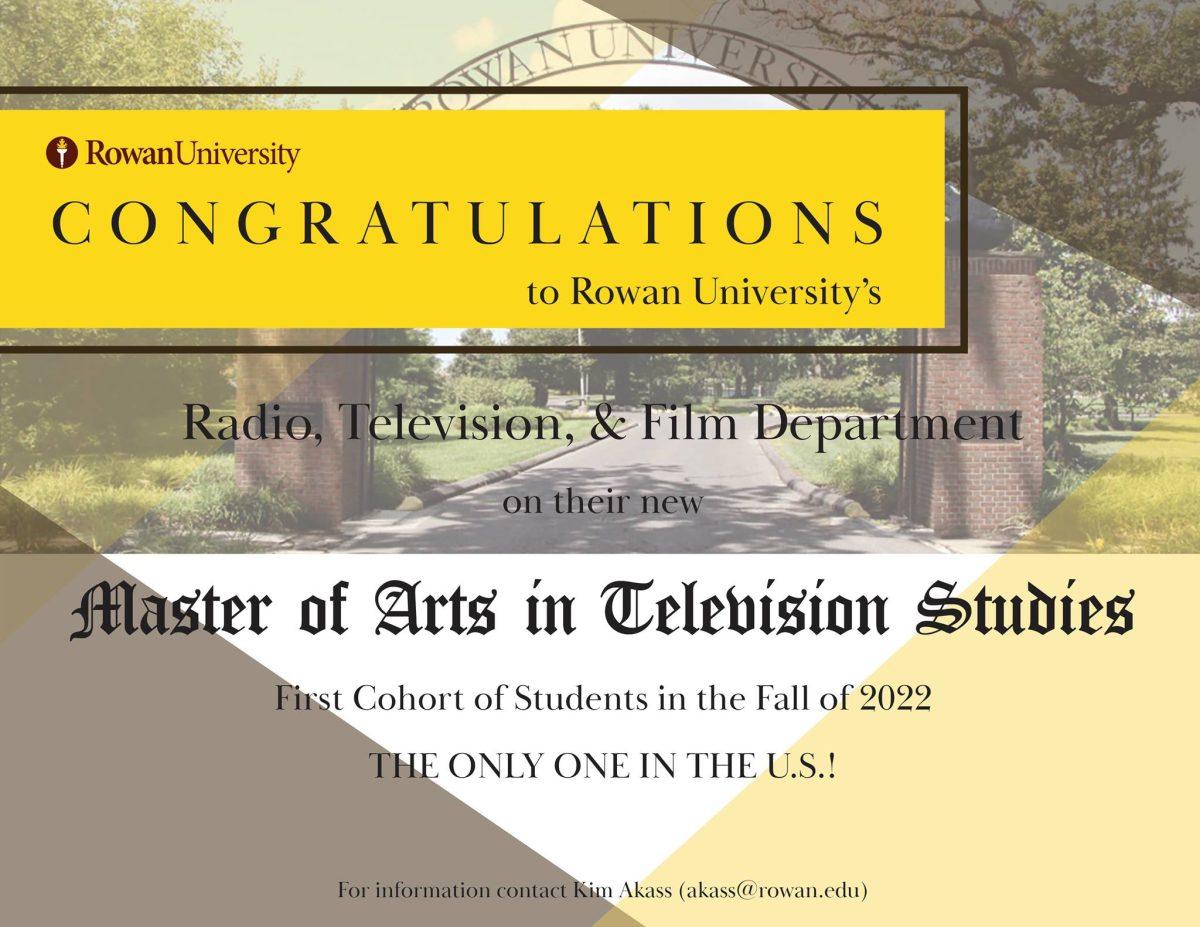Diana King Master of Arts in Television Studies is a new program created for Ric Edelman College of Communication & Creative Arts program that was introduced and began accepting students for the Fall 2022 semester. This program was designed for students who wanted to obtain their graduate degree in television studies specifically.
According to Rowan’s website, the program “encourages students to explore the principles of writing for, on, or about, television. Central to our approach, as noted in our program goals, is the conviction that students will benefit from our three distinct pathways – screenwriting, critical writing and academic writing.”
The master’s program hopes to appeal to a wide range of people. The website suggests a few:
- Potential screenwriters
- Educators who currently teach K-12 or who wish to teach television studies at the college level
- Professionals who wish to write about television for their career or for fun
- Students who wish to prepare for advanced graduate work leading to a Ph.D.
- Students who have a general interest in the global television industry
The Combined Advanced Degree Program in Television Studies allows currently enrolled students to complete both a BA in Radio, Television & Film and an MA in Television Studies in five years.
Applications to the Master of Arts in Television Studies are administered by Rowan Global. A GPA of 3.0 is required to apply.
The King Masters of Arts in Television Studies consists of various faculty from the Rowan television and film department from the Ric Edelman College of Communication & Creative Arts. Kim Akass is the co-coordinator for the MA and 4+1 Dual Degree in Television Studies at Rowan University. Akass has worked with other faculty and staff to create the Master’s curriculum and she talks about what students can expect from the new program.
What can students expect from the television studies program?
It’s very much like learning film studies or English literature or anything like that, in that they learn to analyze TV shows. I particularly look at TV as an expression of culture and ideology. Politics and everything, and we use TV programs to kind of read where they come out from. We also look at the TV industry, and how the TV industry has changed since its inception.
For students that are considering television studies, what can they expect this degree to do for them post-graduation?
Well, we do have a screenwriting pathway, which is totally devoted to how to write for TV. So that’s part of it, but it’s only one course per semester. But it’s kind of supported with the television studies so that people going into television people that want to learn, wants to do script writing can learn about the TV industry, how to get in. Students will also learn about TV history, which is so important. If you’re going to write TV, you have to know what came before. This gives you that basis, that context for a career. I always think that if you go to an interview, and you’ve got a good knowledge of TV history, people will be more impressed than if you go in and just don’t watch television. It sets you up if you really want to work in TV.
Does this master’s program offer any opportunities to help get students developed in post-graduation careers? Is there anything in the works?
There is stuff in the works but it’s not in existence yet. We’re just getting it off the ground at the moment. But we are hoping next year to be able to find some kind of internship opportunities, or at least to give advice on where to go.
For more information about the television studies master programs, students can visit ccca.rowan.edu. Details can be found under the Radio, Television & Film section on Rowan’s website. Students can also reach out to the graduate coordinator Kim Akass via email [email protected].
Applications received by 5 p.m. on March 15 will be considered for a partial scholarship. The final application deadline is July 31.
For comments/questions about this story tweet @TheWhitOnline or email [email protected]
























































































































































!["Working with [Dr. Lynch] is always a learning experience for me. She is a treasure,” said Thomas. - Staff Writer / Kacie Scibilia](https://thewhitonline.com/wp-content/uploads/2025/04/choir-1-1200x694.jpg)










































